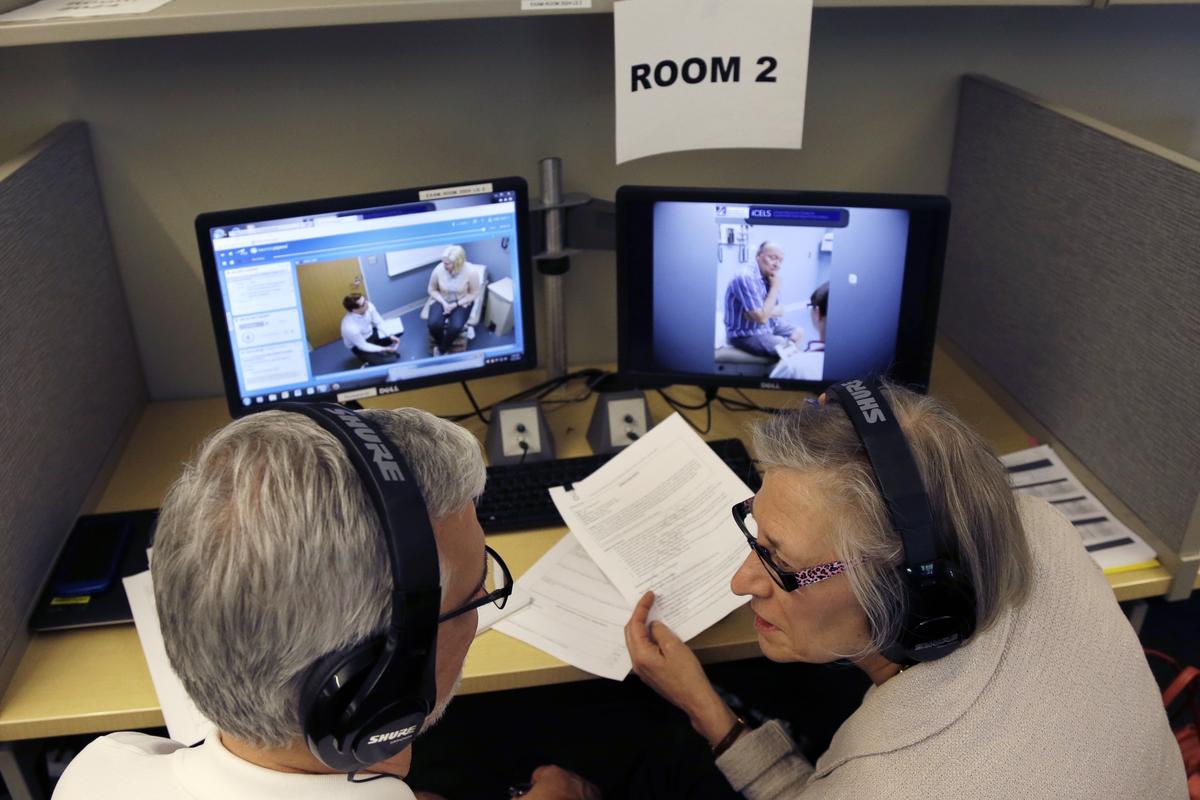At first, the woman tried to hide her painkiller problem. She told the doctor that she still had pain from her past pregnancy, and that she just wanted a refill on her pain medication. After a few questions, though, she admitted that a friend had sold her some OxyContin, and that she’d stolen pills from another friend.
The interaction was all staged, with the patient played by an actor and the doctor played by a medical student last month. The exercise was part of a daylong boot camp at the University of Massachusetts Medical School designed to help physicians in training identify and fight opioid abuse.
“There’s a lot at stake here. We have a public health epidemic, and it’s not getting better, and the health care profession is part of the problem,” said Michele Pugnaire, the medical school’s senior associate dean for educational affairs.
Medical schools nationwide are rethinking their training on opioids amid rising overdose deaths. Schools are taking action after critics said they had inadvertently contributed to addiction problems. Federal health experts say that physicians have been prescribing addictive opioid painkillers too often, and that poor training is frequently to blame.
According to federal data, opioid painkillers were responsible for nearly 19,000 deaths across the U.S. in 2014, an increase of more than 400 percent since 2000. Heroin, by comparison, killed 10,000 people in 2014.
“We are over 10 years into this epidemic, and I don’t think we’ve seen a robust enough response from the medical community,” Michael Botticelli, the White House’s drug czar, told reporters in Boston last month.
Studies have found that medical students at American schools spend far less time learning to treat pain than their peers in other countries, or even veterinary students in the U.S. Even at top schools like Harvard, students say they aren’t trained enough. A group of students there organized their own clinic on addiction treatment this year to fill gaps in the curriculum.
“There’s a sense of urgency to tackle this issue from all fronts, and I think medical schools and teaching hospitals are really committed to doing their part,” said Tannaz Rasouli, senior director of public policy and strategic outreach for the American Association of Medical Colleges.

In this May 11, 2016 photo, University of Massachusetts Medical School’s Dr. Michele Pugnaire, right, senior associate dean for educational affairs, confers with Dr. James Ledwith Jr. as they observe students via laptops during class simulations of treating patients coping with addiction at the medical school in Worcester, Mass. Many U.S. medical schools are expanding their training to help students fight opioid abuse. New training programs at many schools teach students to prescribe opioid painkillers only as a last resort, and to evaluate all patients for signs of drug abuse. (AP Photo/Elise Amendola)
Under pressure from the White House, more than 60 U.S. medical schools pledged in April to teach new federal guidelines for prescribing opioid painkillers.
In Massachusetts, Gov. Charlie Baker rallied the state’s four medical schools to develop a uniform curriculum on opioids and addiction that’s being unrolled this year. Lawmakers in Pennsylvania are pushing for a similar effort there.
Dozens of schools, including Brown and Columbia universities, have received federal grants to teach a standard interviewing method that helps screen patients for drug abuse.
“Students are expected to be able to identify and address that as well as they would someone’s diabetes or hypertension ,” said Dr. Frances Levin, a professor of clinical psychiatry at Columbia’s medical center.
The goal is partly to cut down on opioid prescribing. At Boston University, for example, students learn alternative ways to treat pain such as relaxation therapy and breathing exercises.
But students are also being taught that some populations have been turned away from painkillers too often because of stereotypes.
Black men, for example, have likely been under prescribed opioids “because clinicians fear that they’re maybe going to abuse those drugs,” said Dr. Douglas Hughes, the associate dean for academic affairs at the Boston University School of Medicine.
Many schools are also adding more training simulations like the one at the University of Massachusetts, using trained actors known as “standardized patients.” The idea is to put students through complex cases that they’ll face in practice, and to help gauge whether students are asking patients the right questions in the right way.
At the end of those exercises, students learn whether they made the right decision.
Duke University’s medical school plans to increase its use of standardized patients, too. But some professors there stress to students that, in the real world, there’s often no way to know if they made the right choice.
“I talk to medical students about my own uncertainty and my own doubts,” said Dr. Nancy Weigle, who teaches about community and family medicine at Duke University. “In medicine, we operate in a lot of gray areas. And this is an area that can be really tricky, and there’s not always one right answer.”




